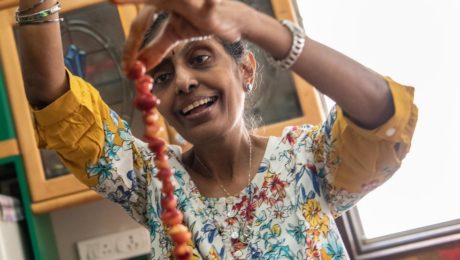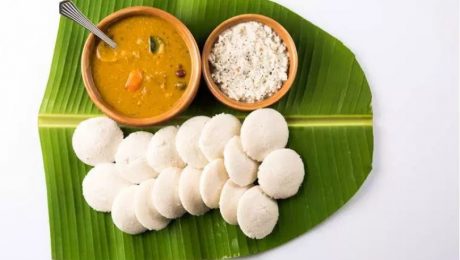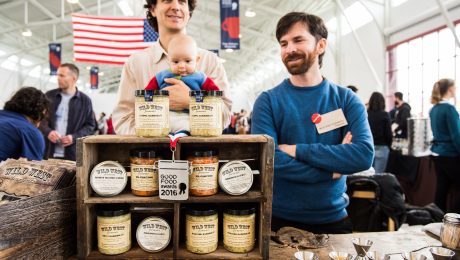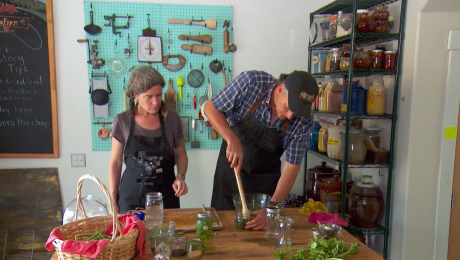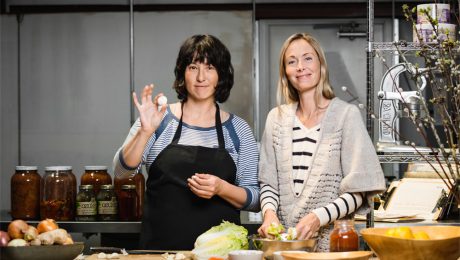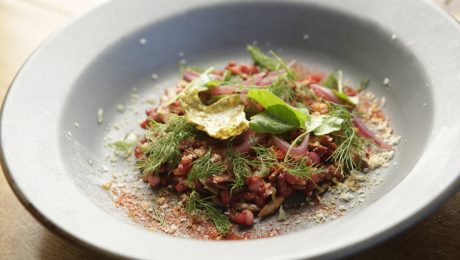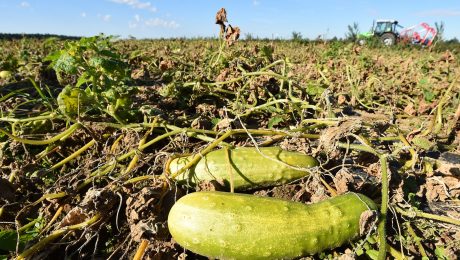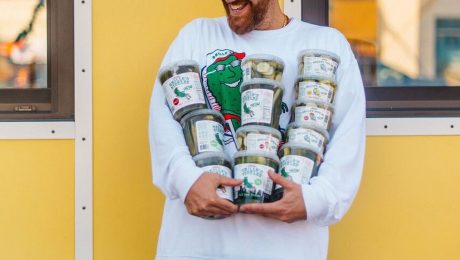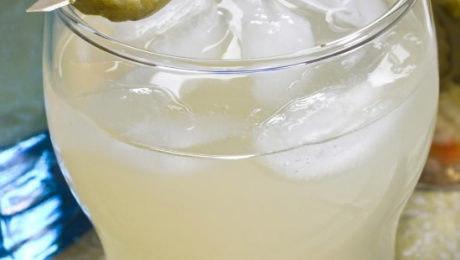India’s Rich Pickling History Kept Alive by India’s “Pickle Queen”
“I just want everyone to understand the depths of Indian cookery,” says Usha Prabakaran, author of the 20-year-old cookbook “Usha’s Pickle Digest.” The New York Times published the fascinating story behind the woman known as India’s Pickle Queen. Her self published book is a cult classic today, highlighting India’s rich history with pickling and fermenting. “ India’s pickle culture goes back thousands of years to when cucumbers and other vegetables were simply preserved in salt. Modern Indian pickles are more complex and probably more delicious, too — hot and tangy, deeply perfumed with aromatics and ground spices.”
Read more (The New York Times)
- Published in Food & Flavor
From Idlis to Appams to Dosas, Rich Fermentation Tradition in India
Fermentation traces back to many Ancient cultures, Korean and European the most publicized. Here is a fascinating look at fermentation in India from the newspaper “The Indian Express.”
From the article: “Fermented foods are a staple in the Indian diet, with most meals incomplete without a bevy of lacto-fermented achaars that add a healthy kick of flavours, from sweet-and-sour to spicy and tangy. These household staples are made by immersing fruits and vegetables in saltwater brine, releasing microbes that generate a natural preservative, in turn amping up the vitamin quotient and nutrition levels of your favourite pickle, whilst enhancing the complexity of flavours savoured with each bite. …
South Indian staples from idlis to appams and dosas feature fermented rice-and-dal batters; in the North, fermentation has led to probiotic drinks suited to the regional climate from the creamy lassi to the tart-and-salty kanji, featuring antioxidant-rich black carrots, mustard seeds, water and black salt, with the potent concoction preserved in ceramic jars and left to ferment in the sun for as long as two to three days before being strained and served. In fact, when you get down to it, even your favourite snacks involve an element of fermentation, with fluffy tea-time dhoklas (a Gujarati speciality) made with a fermented batter of besan or chana dal, curd, water, baking soda and turmeric.”
Read more (The Indian Express)
- Published in Food & Flavor
Deadline for Good Food Awards Extends to Tomorrow
The deadline for the annual Good Food Awards has been extended until tomorrow, August 2. The Good Food Awards invites food producers from across the country to submit their beer, charcuterie, cheese, chocolate, cider, coffee, confections, elixirs, honey, oils, pickles, preserves, preserved fish, spirits, pantry items, snacks and – new this year – grains! (Grains, you ask? We’re talking grits, rice, quinoa tortillas, pasta and more!) Click here to apply.
Award winners from 2019 featured multiple fermented products, like Forward Roots Fermented Vegan Kimchi Sauce, St. Benoit Creamery Plain Yogurt, Elevate Grain Naturally Fermented Beer Grain Crackers, Blue Bus Cultured Local Kraut-chi, Civil Ferments Ethiopian Sauerkraut, Little Apple Treats Original Apple Cider Vinegar, Barrel Creek Provisions Cucmbers, Lindera Farms Apple Cider Vinegar, Gold Mine Natural Food Co Organic Probiotic Golden Kraut, Hex Ferments Sauerkraut, St. Pete Ferments Jackfruit Kimchi, Oly Kraut Local Spicy Garlic Sauerkraut, Real Pickles Organic Garlic Dill Pickles & Organic Garlic Kraut.
Read more (The Good Food Awards) http://bit.ly/2ysMWed
(Photo by: Good Food Awards of 2016 winner, Wild West Ferments)
- Published in Business
“Fermented Food Pioneers” Share Story Behind Their Oregon Homestead
Oregon Public Broadcasting featured Southern Oregon’s fermented food pioneers in their latest segment. Kristen and Christopher Shockey moved to Applegate Valley years ago with hopes of getting their 40-acre homestead to pay for itself. They began selling sauerkraut “before it was cool.” OPB said: “They saw the process that makes sauerkraut, called fermentation, as a way to literally bottle and beauty and the landscape around them.” The Shockey’s started fermenting any and every vegetable their neighbors were growing in surplus. They wrote the book “Fermented Vegetables” in 2014, “helping to propel the fermentation wave that swept things like kimchi, kombucha and kefir into mass culinary consciousness,” OPB added. Today the Shockey’s are teaching fermentation classes and releasing another book.
Read more (Oregon Public Broadcasting)
- Published in Food & Flavor
Ozukè Founder: Fermentation Will Change Diet & Planet
Blending ancestral kitchen traditions and new scientific research will allow fermentation to change our diet — and our planet.
In a TEDx Talk, Mara King, co-founder of fermented food store Ozukè, shares why she is proudly releasing trillions of good bacteria into the population. Her food philosophy rubs against everything the Food and Drug Administration and state health departments practice. While government agencies enforce strict sanitation standards in the name of protecting American’s food, King preaches that it’s wiping out good bacteria and dumping more toxins into the environment.
When King and co-founder Willow King (no relation) opened their Colorado-based food business, a food scientist from the Denver office of the Health & Human Services Department performed a safety inspection. The food expert was confused by Ozukè’s live, fermented pickles, sauerkraut and kimchi. King: “He said ‘Your product is so weird. We follow all these FDA guidelines in food manufacturing in order to diminish bacteria and here you are making it on purpose.’”
“The food we make is actually super, super, super safe, unlike mots processed packaged fresh foods,” King says. “The reason this food is so safe is not because I’m better at this antimicrobial Macarena than anybody else. It’s because the bacteria are doing the work of making the fermented foods pretty much bomb proof.”
Though numerous cultures have been fermenting for generations (“It’s how humans have been eating raw, crunchy vegetables all through hard winters.”), King notes it’s only in the last 10 years that scientists have been able to map the complex fermentation process. By letting bacteria thrive in its own ecosystem, it “creates a food that’s no longer harmful to humans” and makes a more nutritious product.
“Nature does not operate in a vacuum and neither should we,” King says. “We need to understand the complexity of the world in which we live, then we can start to come up with solutions that do honor our heritage.”
King, who great up in Hong Kong, says older Chinese women store an impressive knowledge of food and medicine. Merging ancient tradition with new science is what will create the living solutions needed to continue living on our planet.
“In fermentation, we have a little trick that we use which is called using a started culture or a mother. I believe that our starter culture…is our human cultural history,” King says. “Once we start tapping this information…we’ll start to come up with amazing solutions, solutions that grow, solutions that rot, solutions that breath.”
Today Ozuke (which means “the best pickled things” in Japanese) still makes pickled veggies, but also teaches fermentation workshops. For more information, visit their webpage.
- Published in Food & Flavor, Health
Fermentation Dominating 2019 Food Prediction Lists
Fermentation is dominating 2019 food prediction lists. The New York Times says fermented foods and fermented drinks will rule in 2019. The year’s flavor profile will be “Sour and funky, with shades of heat,” melding fermented ingredients with millennial taste buds. Probiotics and prebiotics will continue to reign as consumers focus on gut health. “As the obsession with digestive health dovetails with the fascination for fermenting, kimchi, sauerkraut and pickled things will work their way into new territory. Smoothies with kefir will be popular, and kombucha will show up in unexpected places like salad dressings,” the article continues. What will you be eating in 2019?
Read more (New York Times)
- Published in Business
America Facing Pickle Shortage; “This is the No. 1 Threat to the Pickle Industry”
America could be facing a pickle shortage. Since the mid-2000s, a mildew has been destroying cucumber crops. Fewer farmers are growing cucumbers now because of the high amount of failed harvests. USDA records show pickling cucumber acreage has declined 25 percent between 2004 and 2015. Lina Quesada-Ocampo, vegetable pathologist at North Carolina State University told NPR: “This is the number one threat to the pickle industry.” Thankfully, vegetable breeder Michael Mazourek, a professor at Cornell University, is developing a cucumber variety resistant to mildew.
Read more (NPR)
- Published in Science
Biz Advice: Growing Small Food Biz from Street Cart to Store Shelves
Business advice from the No. 2 pickle brand in the nation: hire the right high-level people, use creative marketing and sell a fresh product rather than one packed with preservatives. Grillo’s Pickles owner Travis Grillo talked with Yahoo Finance about growing his business from humble beginnings as a pickle street cart in Boston to a brand now sold in Whole Foods and Target, netting $25 million in sales a year. Travis said some of the most well-known pickle brands are made with chemicals for a long shelf life. But Grillo’s is made fresh with an all-natural, fourth-generation family recipe.
Read more (Yahoo Finance) (Photo: Grillo’s Pickles)
- Published in Business
Pickles Staying Power as Pickle Market Grows
It’s National Pickle Day — Forbes explains why pickles are not a fading trend, but a growing food culture with staying power. The pickle market is growing, reaching a value of $12.74 billion by 2020 (half of that – $6.70 billion – is just in the U.S.). Pickles curb dehydration, are packed with antioxidants like vitamin C and E and the fermented vinegar in the juice is good for your gut. Today, pickle concoctions can be found on most aisles of a grocery store, from sports drinks to popcorn to popsicles.
Read more (Forbes)
- Published in Science
Pickles Only Menu Item Remaining the Same in McDonald’s “Health-Conscious” Rebranding
In an effort to attract more health-conscious diners, McDonald’s is removing artificial ingredients from its menu. Ironically, one item will remain the same: the pickle. Arguably the easiest item to remain naturally clean and fermented, McDonald’s will continue to use pickles with artificial preservatives. Their buns, cheese, sauce and patties will now no longer include artificial preservatives, flavors or coloring.
Read more (CNN Money) (Photo: McDonald’s)
- Published in Business

